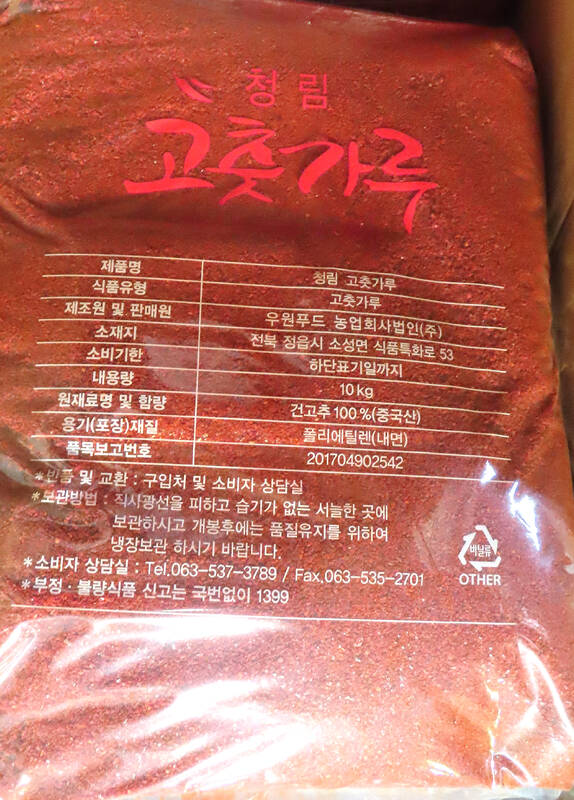The Food and Drug Administration (FDA) yesterday reported 14 batches of imported food-related items that failed border inspections, including 1 tonne of chili pepper powder and 9.9 tonne of dried chili peppers from China that were found to contain excessive pesticide residues.
Among the 14 were two 500kg batches of chili pepper powder imported from China by Tofu Restaurant Group (豆府餐飲集團), which operates several Korean restaurant chains, including Dubu House Korea (涓豆腐), Hanok Tofu (北村豆腐家) and Han Jeong Sig (韓姜熙小廚房).
The two batches of chili pepper powder were found to contain the pesticide chlormequat —which is prohibited in chili in Taiwan — at concentration levels of 0.22ppm and 0.28ppm respectively.

Photo courtesy of the Food and Drug Administration
A batch of 9.9 tonnes of dried chili peppers from China was found to contain 0.04ppm of the pesticide chlorpyrifos, which is also banned in chili in Taiwan, and exceeded the legal limit of 0.03ppm.
FDA Deputy Director-General Lin Chin-fu (林金富) said that as several batches of imported chili powder were found to be tainted with Sudan dye — an industrial additive banned in foods — earlier this year, the frequency of border inspections of chili powder from China and India has been changed to batch-by-batch since March.
Chili powder found to contain Sudan dyes is destroyed, according to tightened regulations, he said.
If it is found to have residues of a prohibited pesticide, it would be returned or destroyed, he said.
Premixed spices imported from Singapore for a Singaporean soy sauce chicken restaurant chain were also found to contain pesticide residues that exceeded the allowable level.
Other imported products that failed border inspections include two batches of fresh satsuma mandarins from Japan and a batch of paprika powder from Spain, both found to contain excessive pesticide residue.
Imports from Indonesia that failed inspections include a batch of Bumbu Pecel Karangsari (a peanut sauce) that contained excessive amounts of the bleaching agent sulfur dioxide; a batch of muntok white pepper with excessive pesticide residue; and a batch of pisang goreng (banana fritter) found to contain a prohibited sweetener.
Other products that failed border inspections were a batch of plates imported from China that failed a dissolution test; and a batch of fresh Chinese cabbage and a batch of fresh celery, both with excessive pesticide residues, and a batch of frozen baby octopus with excessive heavy metal residues, all imported from Vietnam.
The FDA also announced the results of its latest inspection of freshly made beverages and iced food products. It randomly sampled 474 products sold at 384 shops across the nation, with 34 shops failing at least one of the items tested.
These include a Wenshan green tea product sold at beverage chain Da Yung’s (大苑子) Nantou County shop, which was found to have Enterobacteria at a concentration of 410 colony-forming units per milliliter (CFU/mL), which is more than 40 times the allowable limit of 10CFU/mL.
Lin said that stores with products that failed inspections are being dealt with by their local health departments, with fines totaling NT$1.22 million (US$39,600) having been imposed so far.
Additional reporting by CNA

ECHOVIRUS 11: The rate of enterovirus infections in northern Taiwan increased last week, with a four-year-old girl developing acute flaccid paralysis, the CDC said Two imported cases of chikungunya fever were reported last week, raising the total this year to 13 cases — the most for the same period in 18 years, the Centers for Disease Control (CDC) said yesterday. The two cases were a Taiwanese and a foreign national who both arrived from Indonesia, CDC Epidemic Intelligence Center Deputy Director Lee Chia-lin (李佳琳) said. The 13 cases reported this year are the most for the same period since chikungunya was added to the list of notifiable communicable diseases in October 2007, she said, adding that all the cases this year were imported, including 11 from

Prosecutors in New Taipei City yesterday indicted 31 individuals affiliated with the Chinese Nationalist Party (KMT) for allegedly forging thousands of signatures in recall campaigns targeting three Democratic Progressive Party (DPP) lawmakers. The indictments stem from investigations launched earlier this year after DPP lawmakers Su Chiao-hui (蘇巧慧) and Lee Kuen-cheng (李坤城) filed criminal complaints accusing campaign organizers of submitting false signatures in recall petitions against them. According to the New Taipei District Prosecutors Office, a total of 2,566 forged recall proposal forms in the initial proposer petition were found during the probe. Among those

The Mainland Affairs Council (MAC) today condemned the Chinese Communist Party (CCP) after the Czech officials confirmed that Chinese agents had surveilled Vice President Hsiao Bi-khim (蕭美琴) during her visit to Prague in March last year. Czech Military Intelligence director Petr Bartovsky yesterday said that Chinese operatives had attempted to create the conditions to carry out a demonstrative incident involving Hsiao, going as far as to plan a collision with her car. Hsiao was vice president-elect at the time. The MAC said that it has requested an explanation and demanded a public apology from Beijing. The CCP has repeatedly ignored the desires

The Ma-anshan Nuclear Power Plant’s license has expired and it cannot simply be restarted, the Executive Yuan said today, ahead of national debates on the nuclear power referendum. The No. 2 reactor at the Ma-anshan Nuclear Power Plant in Pingtung County was disconnected from the nation’s power grid and completely shut down on May 17, the day its license expired. The government would prioritize people’s safety and conduct necessary evaluations and checks if there is a need to extend the service life of the reactor, Executive Yuan spokeswoman Michelle Lee (李慧芝) told a news conference. Lee said that the referendum would read: “Do